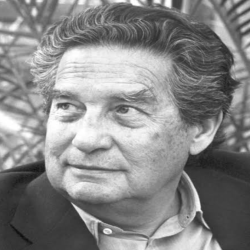
Octavio Paz
| Date of Birth | : | 31 Mar, 1914 |
| Date of Death | : | 19 Apr, 1998 |
| Place of Birth | : | Mexico City, Mexico |
| Profession | : | Poet, Author |
| Nationality | : | Mexican |
Octavio Paz Lozano was a Mexican poet and diplomat. For his body of work, he was awarded the 1977 Jerusalem Prize, the 1981 Miguel de Cervantes Prize, the 1982 Neustadt International Prize for Literature, and the 1990 Nobel Prize in Literature.
Biography
Paz’s family was ruined financially by the Mexican Civil War, and he grew up in straitened circumstances. Nonetheless, he had access to the excellent library that had been stocked by his grandfather, a politically active liberal intellectual who had himself been a writer. Paz was educated at a Roman Catholic school and at the University of Mexico. He published his first book of poetry, Luna silvestre (“Forest Moon”), in 1933 at age 19. In 1937 the young poet visited Spain, where he identified strongly with the Republican cause in the Spanish Civil War. His reflection on that experience, Bajo tu clara sombra y otros poemas (“Beneath Your Clear Shadow and Other Poems”), was published in Spain in 1937 and revealed him as a writer of real promise. Before returning home Paz visited Paris, where Surrealism and its adherents exerted a profound influence on him.
Back in Mexico, Paz founded and edited several important literary reviews, including Taller (“Workshop”) from 1938 to 1941 and El hijo pródigo (“The Prodigal Son”), which he cofounded in 1943. His major poetic publications included No pasaran! (1937; “They Shall Not Pass!”), Libertad bajo palabra (1949; “Freedom Under Parole”), ¿Águila o sol? (1951; Eagle or Sun?), and Piedra de sol (1957; The Sun Stone). In the same period, he produced prose volumes of essays and literary criticism, including El laberinto de la soledad (1950; The Labyrinth of Solitude), an influential essay in which he analyzes the character, history, and culture of Mexico; and El arco y la lira (1956; The Bow and the Lyre) and Las peras del olmo (1957; “The Pears of the Elm”), which are studies of contemporary Spanish American poetry.
Paz entered Mexico’s diplomatic corps in 1945, after having lived for two years in San Francisco and New York, and served in a variety of assignments, including one as Mexico’s ambassador to India from 1962 to 1968; in the latter year he resigned in protest over Mexico’s brutal treatment of student radicals that year. From 1971 to 1976 Paz edited Plural, and in 1976 he founded Vuelta, which continued to be published until his death in 1998; both were reviews of literature and politics.
His poetry after 1962 includes Blanco (1967; Eng. trans. Blanco), influenced by Stéphane Mallarmé’s poetry and John Cage’s theories on music; Ladera este (1971; “East Slope”), which is suffused with Paz’s understanding of East Indian myths; Hijos del aire (1979; Airborn), sonnet sequences created by Paz and the poet Charles Tomlinson building on each other’s lines; and Árbol adentro (1987; A Tree Within), in which many of the poems are based on works by artists such as Marcel Duchamp and Robert Rauschenberg. An English-language selection, The Collected Poems of Octavio Paz, 1957–1987, was published in 1987.
His later prose works, some originally in English, include Conjunciones y disyunciones (1969; Conjunctions and Disjunctions), a discussion of the world’s cultural attitudes; El mono gramático (1974; The Monkey Grammarian), a meditation on language; and Tiempo nublado (1983; “Cloudy Weather,” translated as One Earth, Four or Five Worlds: Reflections on Contemporary History), a study of international politics with emphasis on the relationship between the United States and Latin America.
Paz was influenced in turn by Marxism, Surrealism, existentialism, Buddhism, and Hinduism. In the poetry of his maturity, he used a rich flow of surrealistic imagery in dealing with metaphysical questions. As one critic said, he explored the zones of modern culture outside the marketplace, and his most prominent theme was the human ability to overcome existential solitude through erotic love and artistic creativity. In addition to the Nobel Prize, Paz received numerous other awards, including the Cervantes Prize, the most prestigious Spanish-language accolade. The 15-volume Obras completas de Octavio Paz (“Complete Works of Octavio Paz”) was published from 1994 to 2004. The Poems of Octavio Paz (2012) was a career-spanning collection of his poems in English translation.
Quotes
Beyond myself, somewhere, I wait for my arrival.
The Mexican...is familiar with death. [He] jokes about it, caresses it, sleeps with it, celebrates it. It is one of his favorite toys and his most steadfast love.
A flower without a stem, is beauty waiting to die. A heart without love, is a tear waiting to cry.
What sets worlds in motion is the interplay of differences, their attractions and repulsions. Life is plurality, death is uniformity. By suppressing differences and pecularities, by eliminating different civilizations and cultures, progress weakens life and favors death. The ideal of a single civilization for everyone, implicit in the cult of progress and technique, impoverishes and mutilates us. Every view of the world that becomes extinct, every culture that disappears, diminishes a possibility of life
Love is not a desire for beauty; it is a yearning for completion.
Solitude is the profoundest fact of the human condition. Man is the only being who knows he is alone.
Deserve your dream.
A civilization that denies death ends by denying life.
The supreme value is not the future but the present. The future is a deceitful time that always says to us, 'Not Yet,' and thus denies us... Whoever builds a house for future happiness builds a prison for the present.
The purpose of poetry is to restore to mankind the possibility to wonder.
